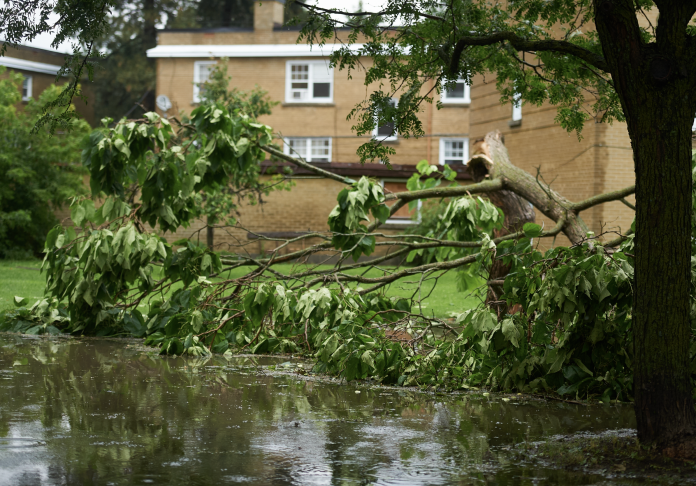By Patrick Langston, All Things Home
Storm damage to our homes and properties is becoming more likely as climate change advances.
Knock on wood we avoid more disasters like the May 2022 derecho, which killed 11 people and caused more than $875 million in insured damages in Ontario, including Ottawa, and Quebec. But more severe thunderstorms like the ones we’ve seen this summer, high winds, tornadoes (more than a dozen have touched down in the Ottawa area since 2000 alone), and crippling ice and snowstorms are a near certainty.
Here’s what you need to know when severe storms do strike.
Checking for damage
Storms can create hazards around your home, from fallen wires to broken tree branches. If you find dangerous situations like this, leave mediation to the professionals. Also, check for damage at a couple of different times of day: changing light levels can reveal problems you may have missed the first time.
Roof, gutters and more
Even a small amount of damage to your roof can lead to big problems from leaks. Using binoculars and from the ground, check for broken, slipped or missing shingles, loose or dented flashing around your chimney and roof vents, and damaged fascia and soffits.
Are your gutters bent or filled with debris from the storm? Free-flowing gutters and drainpipes are critical in directing water away from your home. Again, consider calling in the professionals to handle the ladder work.
Windows and doors
Flying debris and high winds can cause small cracks in the glass, loose panes and frames, and damaged exterior trim, all leading to water infiltration and other problems. Check each window carefully and make sure they open and close smoothly and can still be locked easily.
Winds in the recent Ottawa storm hit 190 kilometres per hour in some areas, according to Hydro Ottawa. That was strong enough to destroy barns and silos, which means it was also strong enough to damage a weak door or one with rot in the frame. Do all your doors still open, close and lock smoothly? If not, call in the pros.
Trees and other hazards
Storms in Ottawa have caused massive tree damage in some neighbourhoods. Check your trees for cracked or broken limbs, loose branches and partial uprooting (the latter doesn’t always mean the tree is doomed: consult an arborist to see if it can be saved). Don’t try to remove large broken branches or limbs yourself — injury or even death can result — and remember that even a light wind can dislodge broken branches. Rope off the area to keep others safe and hire a reliable tree service to handle the damage.
Once you’ve ensured your trees are safe, check fences, sheds and other outdoor structures for damage.
Signs of interior damage
Hard-driving rain can penetrate exterior walls, especially if the walls, windows or doors are storm-damaged. Watch for water stains on inside walls and call in a professional if you think there may have been permanent cosmetic or structural damage.
Have you checked your basement carefully for water leakage and taken a careful look in the attic for leaks there? If you had any roof damage, check your attic a few times in the weeks after the storm in case mould is growing on the insulation or elsewhere.
Insurance and repairs
Keeping your home insurance policy up to date will help cover the cost of repairs and replacement in case of storm damage. Learn more about home insurance and disasters at the Insurance Bureau of Canada.
Watch out for scammers and incompetent repair businesses. They tend to come out of the woodwork after a disaster. Don’t hire a contractor who can’t produce liability insurance, references and other assurances of legitimacy.
Reducing the potential for future damage
Keeping your home well maintained will help protect it against wind, rain and other natural hazards:
- Caulk windows and doors to prevent moisture and cold penetration.
- Test your sump pump to ensure it’s ready for high water levels.
- Follow seasonal maintenance routines.
- Have an emergency kit ready to keep your family safe in case of prolonged power outages or other disasters.
- Keep an up-to-date home inventory to make insurance claims easier.
For more on these and other tips to protect and maintain your home, visit AllThingsHome.ca.
Patrick Langston is the co-founder of All Things Home Inc. The veteran journalist has covered the Ottawa housing industry since 2008.
